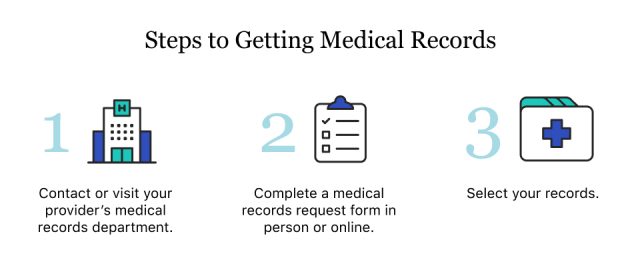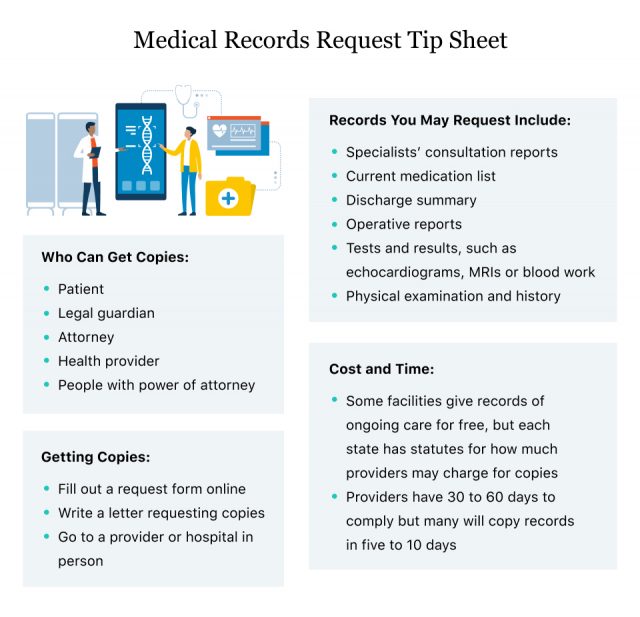How to Request Medical Records
You have a legal right to request and obtain your medical records. Most health care providers make records accessible through secure online patient portals, though this is not the only way to obtain them. Here is an overview of how to get your medical records — and what to do if you’re denied access.
Why Keep Medical Records
Keeping your medical records — also called personal health records — could make your health care experiences and relevant finances more manageable. When you visit a new doctor or urgent care facility, they likely won’t have access to your medical records unless you provide them. Having these documents on hand can help you get a fuller picture of your overall health. Having access to your records can also help financially, too. Miscommunications between your doctor and the insurance company or incorrectly coded diagnoses or treatments can lead to higher medical bills. Reviewing your records can help you see where things went wrong and possibly expedite the resolution process.
- Stay informed about your health trends.
- Review your medical history with new providers more easily.
- Simplify discussing prescriptions, vaccines and any possible interactions.
- Understand ER, hospital and doctor charges and rectify any billing issues.
- Ease management of insurance claims and coverage.
The Health Insurance Portability and Accountability Act, or HIPAA, guarantees that your medical records stay private until you give someone written permission to view or possess them. For example, patients typically give their health insurance company access to records to ensure it pays their claims.
Requesting Your Medical Records
You can request your medical records through your health care provider’s online patient portal, in person at your doctor’s office or via email or letter. Your doctor’s office manager or an insurance company representative can identify every document in your file, which allows you to ask for specific paperwork rather than all records when necessary.
For example, if you had surgery that required an implant, such as knee replacement or hernia mesh surgery, your operative or surgical notes contain information about the implant’s model and brand. This is important information for recalls or if you need to file a lawsuit because of a faulty device.

Each state has laws regarding how long medical records must be kept. Most states mandate providers keep records for five to ten years, and the median time period is seven years. For a complete list, visit HealthIT.gov.
Another way to obtain records is to fill out a request with the consumer reporting agency MIB, which collects and shares your medical data with insurance companies. It must provide your records upon request once per year per the Fair Credit Reporting Act, and you can fill out a request form directly on its website.
Requesting Military Medical Records
If you need to request military medical records, contact the U.S. Department of Veterans Affairs. The VA houses all military medical records across branches of the service.
You can get access to these records by filling out standard VA Form 180. Mail the completed form to the correct records custodian listed on the form. If you have any issues, contact the VA at 800-827-1000 to find the closest VA office, where you will work with a patient advocate who can help you.
Your paperwork will likely be digitized if you separated from the service after Jan. 1, 2014.
In 2024, the Department of Defense fully implemented its new electronic health record system, MHS GENESIS. When the rollout is complete, this EHR program should be available in all parent military treatment facilities, USCG and NOAA sites, and VA medical centers.
As long as your service treatment records, or STRs, don’t contain classified information, you should be able to get them through your Department of Defense electronic patient portal, TRICARE Online or Genesis, the DOD’s military health system. (TRICARE is moving its patient communications and records from its portal to the Genesis portal.)
Electronic Records and Patient Portals
The majority of health care systems have Electronic Health Records systems. EHRs provide patient portals that store medical records and streamline doctor-patient communication and prescription management.
Portals let you read, download and print stored health information. Records typically available through portals include summaries of doctor visits, lab results, medication lists, allergies, immunizations and discharge summaries. Many labs, including LabCorp and Quest, also have separate portals.
Patient portals, however, may not contain detailed operation reports or physician’s notes. For more complete information, you may need to contact your doctor or specialist directly.
How Long Does It Take?
Depending on the state, providers have 30 to 60 days to process a request, and your wait time shouldn’t exceed 90 days. According to the American Health Information Management Association, many facilities provide patient-requested records in fewer than five days.
The VA and TRICARE do not have specific fulfillment timelines. No matter what organization or provider you request records from, keeping copies of your requests is advisable in case you need to follow up.
How Much Does It Cost?
Simple, small record requests are often free. Under HIPAA, providers can’t charge you for the labor of searching or retrieving records. They also can’t deny you a copy of your records if you haven’t paid for services rendered. But they can charge you a reasonable fee for the copies.
Holly Ennis, a lawyer focusing on patient rights, told Drugwatch that “There are statutes in every state concerning how long health care providers must retain medical records and what they are allowed to charge for copying said records.”
In most states, medical records with associated costs run between $0.25 and $2 per page. The rate usually lessens as the page count increases. Some states are moving toward caps on fees for digital records.
Records from a Provider No Longer in Practice
If you need records from a doctor who has retired or left their practice, you still have the right to access them. The American Medical Association states that physicians who are retiring or closing their practices need to contact patients about changes and their options regarding medical records. Practitioners also must have HIPAA-compliant storage plans for unclaimed records.
In the event that you missed your doctor’s notification or the deadline to respond, try writing a letter to your doctor’s office, as physicians are encouraged to leave a forwarding address with the post office. If that doesn’t work, you can attempt to find out where your records are by contacting the medical facility, your local chamber of commerce or health department, or your physician or their staff via email or social media.
If the provider didn’t leave any details before leaving the practice and can’t be contacted, patients may be able to piece together records from hospitals, labs and specialists they have visited. The insurance company may also be able to help. Consider printing off records from patient portals regularly and storing them safely to help expedite this process.
Who Can Request Records?
You have a right to request and obtain your medical records, but sometimes, a third party must request them. Third parties may include parents, grandparents, adult children, legal guardians, patient advocates, attorneys, and caregivers. All must have written permission from the patient to get the records.

“An attorney would still need a signed medical authorization release to obtain a client’s medical records from any health care provider,” Ennis explained. “Often, many health care providers respond more quickly to an attorney than to a patient.”
Requesting Another Person’s Records
Requesting another person’s medical records has its own set of requirements. There are different forms to fill out, and the requestor must have the proper legal documents to show the medical records department.
If someone can no longer make decisions or is incapacitated, their representatives must have a power of attorney for health care and finances. This type of power of attorney is a specific document that grants a third party the legal ability to access medical records.
Requesting medical records about a deceased patient requires the requester to be an executor of the deceased patient’s estate or to have permission from the executor for access. If no executor exists, another person can petition to become the executor through a probate court. The petitioner must have documentation regarding their relationship to the deceased.
Records Your Provider May Deny
There are rare exceptions when a provider can deny access to a medical record. The two most cited reasons for denial are mental health concerns and ongoing litigation.
- Psychotherapy notes where suicide or other patient harm is a concern
- Information that may endanger someone else’s safety, security or legal privacy, such as adoption records
- Records from correctional institutions that could endanger an inmate, corrections employee or corrections visitor
- Emergency room records are specific to hospital or company procedures and not patient care
- Information involved in ongoing litigation
- Data from ongoing research
Most state laws protect providers if they claim that releasing the record could harm you or someone else. However, judges rarely uphold a denial strictly because a patient could be upset or angry about the record’s contents.
Any denials must be spelled out in plain language, explaining the reason for the denial in a letter, email or fax.
What to Do If Your Request Is Denied
If a provider denies a medical records request, review your request and ensure you gave the provider all the required information and that all authorizations have signatures. Sometimes, merely calling the provider’s medical records department resolves any issues.
- Date of birth
- Name
- Social Security number
- Contact information (address and phone number)
- Email address
- Dates of service and specific records requested (tests, discharge notes, etc.)
- Method of delivery (email, in person, through mail)
“Patients are absolutely entitled to obtain their medical records. Usually, the provider has 30 days to respond,” Ennis said. “Patients need to look up the state law in their state so they are ready to demand their records under legal authority if the health care provider is noncompliant.”
You can also file a complaint with the U.S. Department of Health and Human Services Office for Civil Rights if you feel a provider violated your rights. You must file within 180 days of a violation unless you can prove “good cause” for an extension.
How to Correct Errors or Omissions
It is possible to correct an error or omission in your medical records. You can often fix the error by directly messaging a nurse or administrator through the patient portal.
Sometimes, you have to call the provider directly. Other times, you may need to write a formal letter to the doctor’s office or insurance company requesting a correction.
Follow up to ensure any requested corrections get made.
Calling this number connects you with a Drugwatch.com representative. We will direct you to one of our trusted legal partners for a free case review.
Drugwatch.com's trusted legal partners support the organization's mission to keep people safe from dangerous drugs and medical devices. For more information, visit our partners page.


